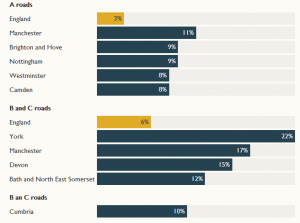Reading the paper this morning and came across this very interesting article.

Plastic roads will be introduced across Britain under plans to prevent potholes causing havoc for drivers and cyclists.
The Department for Transport (DfT) said that almost £23 million was being put aside as part of research designed to future-proof roads.
Some £1.6 million of the fund will be used to extend an existing trial in Cumbria that involves recycling waste plastic and using it to form a tough new road surface that is far less likely to break up.

Other technologies to be tested include using kinetic energy gathered from roads to power lighting and using geothermal energy to prevent car parks and bus stations freezing over in winter.
The announcement was made as DfT figures showed that more than one in six local roads in England was in need of repair. Seventeen per cent of unclassified roads — the majority of roads intended for local traffic, including residential streets and country lanes — “should have been considered for repair” in the year to the end of March 2018. It was the same as a year earlier. Three per cent of local A-roads were in a poor state. The proportion increased to 11 per cent in Manchester and 9 per cent in Brighton and Nottingham.
In the Cumbria trial, led by MacRebur, a company, 100 per cent recycled waste plastic is turned into small pellets which are added into an asphalt mix in place of bitumen. It is said to increase the lifespan of roads and cut maintenance costs. The DfT grant will lead to it being extended elsewhere in the UK. Toby McCartney, the company’s managing director, said: “[Our solution] gives the asphalt the flexibility to cope with expanding and contracting in our changing weather conditions.”
In Buckinghamshire kinetic energy recovery technology will be used to gather energy from the carriageway and relay it to roadside battery units. This can then be used to power street lights. In trials in Bedfordshire geothermal energy will be used to heat water pipes laid just below the surface to help to de-ice car parks and bus stations.
Maintenance required
Last year 3 per cent of A roads and 6 per cent of the B and C road network in England should have been considered for maintenance
The pothole problem has been causing alarm. Recent research by the RAC indicated that more than 674,000 were reported in the past 12 months, a rise of 33 per cent in three years. Critics claim that local roads have been left in a poor state because of years of underfunding as councils spend more on social care.
In many areas, last year’s harsh winter led to already poor roads simply crumbling away. It resulted in rising numbers of accidents among cyclists and left thousands of cars with damaged shock absorbers, broken suspension springs and distorted wheels.
Chris Grayling, the transport secretary, said: “Potholes are the number one enemy for road users. . . Today’s trials will see how new technologies work in the real world.”
Nicholas Lyes, the RAC’s head of roads policy, said: “This project is no replacement for the government looking seriously at the funds that are made available to fix local roads and putting in place longer-term funding.”
Source: The Times https://www.thetimes.co.uk/article/plastic-roads-win-new-funding-in-bid-to-tackle-pothole-menace-ks2mq9dw8

